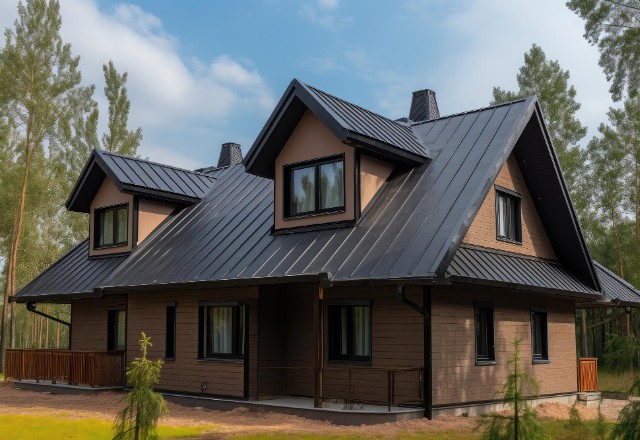A mansard roof, also known as a French roof, is a unique four-sided gambrel style roof with steep lower slopes and flatter upper slopes on each of its sides. The design is named after the 17th century French architect François Mansart, who popularized this iconic roof form in many of his builds.
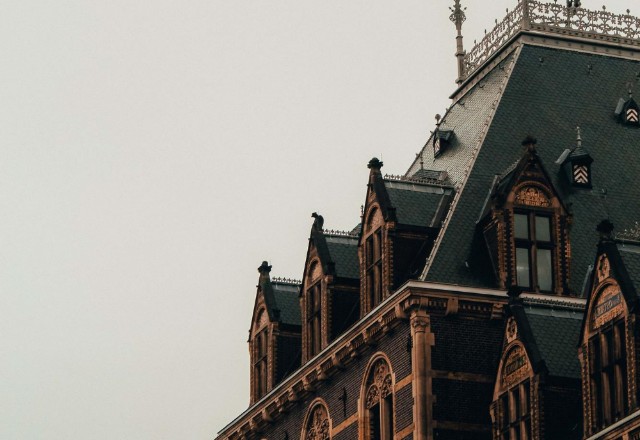
Mansard roofs maximize the amount of usable living space in a building by enabling a full story height attic space. The steeper lower slope minimizes the overall height of the roof, while the flatter upper slope allows for a full floor of habitable attic space. Mansard roofs can be constructed out of various materials like slate, wood shingles and clay tiles but metal mansard roofs have emerged as a durable and versatile option.
Need a roofing contractor to install or repair a mansard roof?
Call us (509)201-4190 or send the form
Metal mansard roofs provide complete weather protection just like any other roofing system. Standing seam galvanized steel and aluminum are common metal roofing materials used for this application. Metal mansard roof systems are available in different profiles, finishes and colors to complement a home’s overall architectural style. These roofs are designed to seamlessly integrate with the existing trim details, dormers and decorative elements of the façade. Besides residential spaces, metal mansard roofs are widely employed in commercial projects like restaurants, hotels, retail outlets, warehouses and more to create a stately exterior.
Metal mansard roofs offer several advantages that make them a smart, long-lasting roofing choice. We will explore all the applications, designs, material choices, maintenance and cost considerations associated with mansard metal roofs in this comprehensive guide.
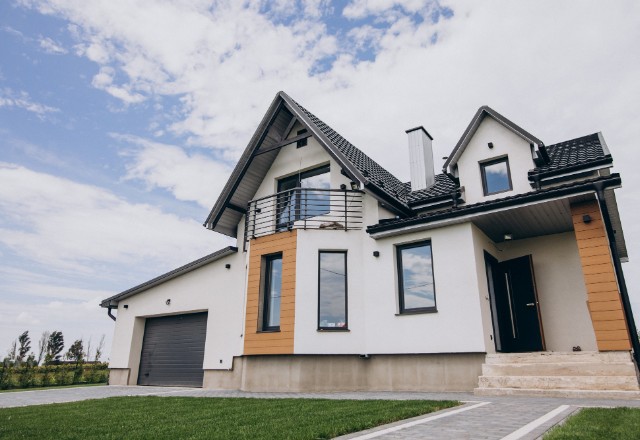
Popular Uses for Mansard Metal Roofs
Mansard metal roofs are an extremely versatile design and are widely employed in both residential and commercial projects.
Residential Homes
Mansard roofs can enhance a home’s curb appeal and work with almost any architectural style including:
Victorian
Queen Anne
Second Empire
Gothic Revival
Colonial Revival
Neoclassical
Coastal Cottages
Farmhouse Style Homes
Specific applications on residential homes include:
Entire roofline
Accent roofs over additions
Covered porches
Pool cabanas
Garage and carriage houses
Dormers and turrets
Commercial and Industrial Buildings
The unique aesthetic and expansive space offered by mansard roofs make them ideal for many commercial building types:
Hotels and Resorts Styles – Alpine, Seaside, Boutique Hotels
Restaurants and Breweries Styles – Craft Beer Venues, Upscale Casual Dining
Retail Stores Types – Specialty Shops, Strip Malls, Outlet Centers
Automotive Businesses Types – Service Centers, Dealerships, Gas Stations
Warehouses and Self Storage
Mixed Use and Adaptive Reuse Developments Examples – Loft Apartments, Office Spaces
With their unique aesthetic properties and expansive interior space, mansard metal roofs have proven to be an extremely versatile design choice suitable for a wide range of residential settings and commercial building types. Their flexibility to complement various architectural styles makes them a timeless roofing option that adds beauty and functionality to any property.
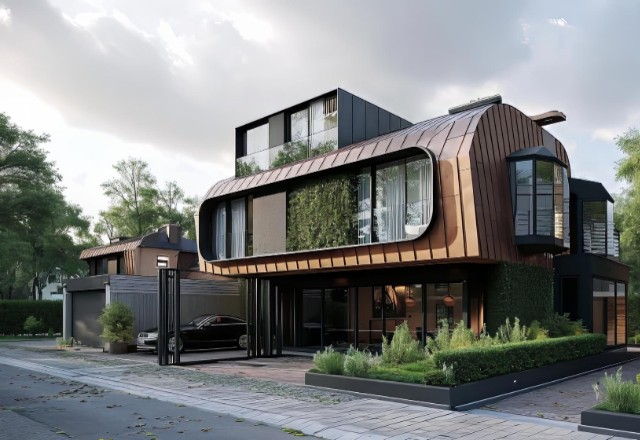
Design Inspiration
Mansard metal roofs provide immense design flexibility thanks to the multitude of available colors, finishes and customization possibilities.
Color Options
Mansard metal roofs are available in a vast range of standard and custom colors to complement any home design:
Common Color Choices:
Black
Gray
White
Silver
Copper
Bronze
Galvalume (Aluminum-Zinc Alloy)
Specialty Colors:
Bold Hues – Red, Green, Blue
Earth Tones – Terracotta, Brown, Beige
Dual Tone/Blends
Special Finishes
Unique visual textures can be achieved by specifying these specialty metal finishes:
Wood Grain – Simulates color/grain of shake roof
Slate, Tile or Cedar Profiles – For dimensional appearance
Rusted, Weathered or Wrinkled Finishes
Interlocking or Scalloped Panel Styles
Customization Possibilities
Monogrammed/Custom Signage
Crests and Accent Bands
Widow’s Walks/Decorative Railings
Custom Dormers and Turrets
Accent Elements – Finials, Lighting, Weathervanes
With limitless color and finish options and endless customization potential, mansard metal roofs can beautifully reflect the style of any building.
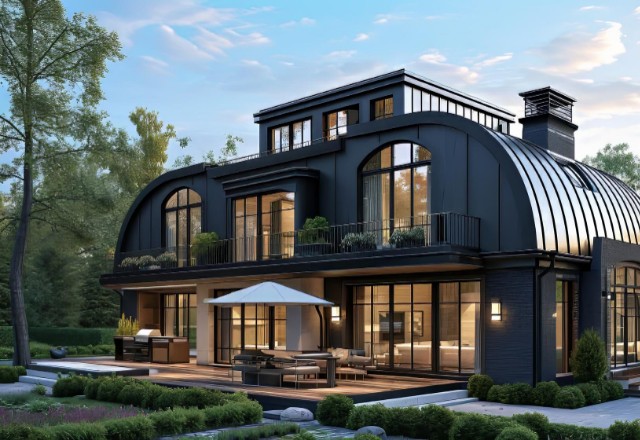
Considerations for Choosing Colors
When selecting a color for your mansard metal roof, it’s essential to consider various factors beyond personal taste.
Climate is one crucial aspect to keep in mind; lighter colors reflect sunlight and help maintain cooler indoor temperatures during hot seasons. On the other hand, darker hues absorb heat and can contribute to warmer interiors in colder climates.
Another consideration is architectural style – certain color combinations work better with specific architectural designs. For example, earthy tones like brown or tan may harmonize well with rustic-style homes, while vibrant colors could be more suitable for contemporary residences.
| Roof Color | House Exterior Walls Color |
|---|---|
| Charcoal | Light Gray |
| Copper | Cream |
| Forest Green | Beige |
| Slate Gray | White |
| Terracotta | Tan |

Maintenance and Accessories
When properly installed, mansard metal roofs are designed to be low-maintenance. However, periodic inspections and care is key to maximize their longevity.
Addressing Common Issues
Some common issues and resolutions include:
Issues | Solutions |
Leaks | Ensure proper installation with correct flashing and sealant. Identify entry points of any leaks. Reapply sealant/closure strips if needed or replace any damaged panels. Ensure proper drainage. |
Rust spots | This is most common on galvanized steel roofs after 10+ years. Regularly inspect and maintain the roof to prevent rust formation. Have a professional roofing contractor perform rust treatment and paint touch ups. |
Poor drainage | Clear gutters and downspouts regularly to avoid water accumulation |
Fading color | Apply UV-protective coating to maintain the color and appearance |
Dents and dings | Promptly replace any dented panels to prevent water intrusion. Consider installing rooftop walk pads for any maintenance access areas. Use a professional to repair any dents or dings to prevent further damage. |
Loose fasteners / panels / connections | Tighten or replace loose fasteners to secure the roof properly. Have a professional re-secure any loose roof panels and check that all connections are properly sealed. |
Accessories
Important accessories include:
Rain diverters – Help control water runoff. Critical for lower roof edges.
Snow Guards – Prevents ice dams and slippage in heavy snow areas.
Gutter Extenders – Carry water well away from structure. Prevent soil erosion.
Roof Ventilation – Aid air circulation between attic spaces to minimize humidity and heat condensation issues.
Care and Inspections
A few general upkeep tips include:
Inspect roof after major storms and clear debris
Annually check for loose panels, seal breaches
Keep drainage paths unblocked
Following best practices will help guarantee decades of peak performance.
Frequently Asked Questions
Homeowners often have additional queries around cost, durability, installation, and performance benefits of mansard metal roofs.
What are the typical costs for installing a mansard metal roof?
On average, expect to pay $6-$12 per sq.ft installed for metal mansard roofs. Cost varies based on:
Type of Metal – Copper and zinc are premium materials
Roof Pitch/Access Difficulty – Steeper pitches cost more
Customizations – Special finishes, colors, details add cost
Over its lifetime though, a metal roof costs far less than alternatives like asphalt shingles which need replacing every 15-20 years.
What is the lifespan of a properly installed metal mansard roof?
Properly installed metal roofs can last 50+ years. Key longevity factors include:
Metal Gauge/Thickness – Recommended 26 gauge minimum
Slope – Ideal pitch is at least 3:12
Height/Wind Exposure – Consider uplift resistance requirements
Coastal Environments – Galvalume finish adds salt spray resistance
What are some best practices to follow for installing these roofs?
Ideal installation practices involve:
Established local contractor with proven specialty experience
Tearing off old roof instead of installing over existing materials
Adding protective underlayments
Ensuring adequate attic ventilation
Flashing critical joints with water tight closures
Snow guard and rain diverter accessories in heavy precipitation areas
How can a metal mansard roof improve a home’s energy efficiency?
Metal roofs provide excellent insulation thanks to the air pockets between panels. This yields lower energy bills – savings range from 15-40% based on climate and building type.



 509-201-4190
509-201-4190

